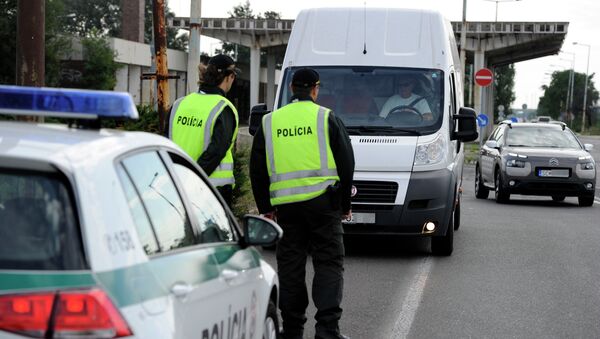https://sputnikglobe.com/20160118/migrants-not-welcome-slovakia-1033338707.html
EU Members Welcomed Migrants Initially, Now Closing Borders – Slovak PM
EU Members Welcomed Migrants Initially, Now Closing Borders – Slovak PM
Sputnik International
Member states of the European Union that initially greeted refugees fleeing war-torn countries now hurry to close their borders despite the Schengen Agreement... 18.01.2016, Sputnik International
2016-01-18T20:42+0000
2016-01-18T20:42+0000
2023-02-09T11:51+0000
https://cdn1.img.sputnikglobe.com/img/102698/36/1026983630_0:129:4165:2485_1920x0_80_0_0_62e5b805aa0d0ffcf3281c02d3add7b0.jpg
slovakia
central europe
Sputnik International
feedback@sputniknews.com
+74956456601
MIA „Rosiya Segodnya“
2016
Sputnik International
feedback@sputniknews.com
+74956456601
MIA „Rosiya Segodnya“
News
en_EN
Sputnik International
feedback@sputniknews.com
+74956456601
MIA „Rosiya Segodnya“
Sputnik International
feedback@sputniknews.com
+74956456601
MIA „Rosiya Segodnya“
newsfeed, europe, society, major migrant crisis in europe, slovakia, central europe, schengen agreement, european union (eu)
newsfeed, europe, society, major migrant crisis in europe, slovakia, central europe, schengen agreement, european union (eu)
EU Members Welcomed Migrants Initially, Now Closing Borders – Slovak PM
20:42 GMT 18.01.2016 (Updated: 11:51 GMT 09.02.2023) Member states of the European Union that initially greeted refugees fleeing war-torn countries now hurry to close their borders despite the Schengen Agreement, the Slovak Prime Minister Robert Fico said on Monday.
PRAGUE, (Sputnik) — "It is those countries that have most openly welcomed migrants today make decisions against the Schengen," Fico said during a briefing, as quoted by the Bratislava Aktualne news portal.

18 January 2016, 02:43 GMT
The Slovak prime minister added that the ongoing massive refugee crisis in the bloc would be the main topic on the agenda during Slovakia’s EU presidency, which starts on July 1.
On Saturday, Austrian Chancellor Werner Faymann announced that Vienna was temporarily suspending the Schengen Agreement and toughening border checks.
So far, seven EU states applied border controls along the internal borders of the Schengen Area to curb the influx of undocumented immigrants — Norway, Sweden, Denmark, Austria, Germany, France and Malta.

16 January 2016, 18:44 GMT
The Schengen Agreement abolishes internal borders, enabling passport-free movement between parties to the treaty. The agreement provides for the temporary closure of internal borders in the event of a threat to national security.
The European states are still striving to find an optimal solution to the major refugee crisis, with hundreds of thousands of people fleeing war and poverty in the Middle East and North Africa.






